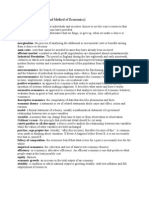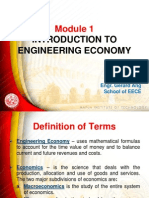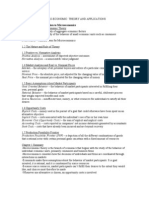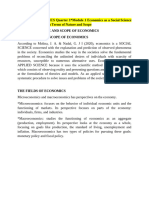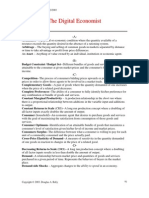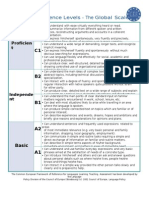0 ratings0% found this document useful (0 votes)
69 viewsBasic Needs
Basic Needs
Uploaded by
aljhondelacruz22This document defines key economic terms related to the study of economics. It discusses how economics examines how scarce resources are used to satisfy unlimited human wants. It also explains the three elements involved in satisfying wants: human wants, use of resources, and techniques of production. Finally, it outlines some of the purposes of economic analysis, including understanding aggregate demand and supply as well as the determinants that shift demand and supply curves.
Copyright:
© All Rights Reserved
Available Formats
Download as DOCX, PDF, TXT or read online from Scribd
Basic Needs
Basic Needs
Uploaded by
aljhondelacruz220 ratings0% found this document useful (0 votes)
69 views2 pagesThis document defines key economic terms related to the study of economics. It discusses how economics examines how scarce resources are used to satisfy unlimited human wants. It also explains the three elements involved in satisfying wants: human wants, use of resources, and techniques of production. Finally, it outlines some of the purposes of economic analysis, including understanding aggregate demand and supply as well as the determinants that shift demand and supply curves.
Original Description:
uy
Copyright
© © All Rights Reserved
Available Formats
DOCX, PDF, TXT or read online from Scribd
Share this document
Did you find this document useful?
Is this content inappropriate?
This document defines key economic terms related to the study of economics. It discusses how economics examines how scarce resources are used to satisfy unlimited human wants. It also explains the three elements involved in satisfying wants: human wants, use of resources, and techniques of production. Finally, it outlines some of the purposes of economic analysis, including understanding aggregate demand and supply as well as the determinants that shift demand and supply curves.
Copyright:
© All Rights Reserved
Available Formats
Download as DOCX, PDF, TXT or read online from Scribd
Download as docx, pdf, or txt
0 ratings0% found this document useful (0 votes)
69 views2 pagesBasic Needs
Basic Needs
Uploaded by
aljhondelacruz22This document defines key economic terms related to the study of economics. It discusses how economics examines how scarce resources are used to satisfy unlimited human wants. It also explains the three elements involved in satisfying wants: human wants, use of resources, and techniques of production. Finally, it outlines some of the purposes of economic analysis, including understanding aggregate demand and supply as well as the determinants that shift demand and supply curves.
Copyright:
© All Rights Reserved
Available Formats
Download as DOCX, PDF, TXT or read online from Scribd
Download as docx, pdf, or txt
You are on page 1of 2
Basic Needs mans needs required for his survival.
Business Firm servers as the economys producing unit to
satisfy human wants with goods and services.
Capital materials used in the production of goods and service
including money.
Economic Analysis the process of directing economics
relationship by examining economic behavior and events and
determining the causa relationship among the data and activities
observed.
Economic Resources inputs used I the production of goods and
services.
Economic System the framework in which society decides on its
economic problems.
Economics a social science concerned with mans problem of
issuing scare resources to satisfy unlimited wants.
Empirical Validation the use of statistical evidence to prove the
validity of a hypothesis.
Entrepreneur organizes all other factors of production to be
used in the creation of goods and services.
Free Enterprise System a system in which all economic
resources are privately owned. Individuals are free to engaged in a
business of their choice.
Function depicts the relationship between two or more
variables.
Household is the basic consuming unit in the economy.
Labor human effort expended in production regarding basic
economic problems.
Land natural resource, not man-made, covering anything found
on or under land, water, forest, minerals, and animals.
Luxury Goods good that man can do without.
Macroeconomics (National Income Analysis) the branch of
economics that studies the economy as a whole.
Market context in which buyers and seller buy and sell goods,
service, and resources.
Microeconomics (Price Theory) the branch of economics that
deals with parts of the economy such, as the household and the
business firm
Normative economics an analysis of economics which deals
with what should be.
Opportunity Cost value of a foregone alternative of a specific
resource.
Positive Economics an analysis of economics which deals with
what actually is.
Right to Private Property the right of private individuals and
enterprises to own things of value.
Theory/Hypothesis an unproven proposition tentatively
accepted to explain certain facts or to provide a basis for further
investigation.
Variable a factor that is subject to change or variation.
Wants the various desires and needs of consumers that have to
the satisfied through the use of goods and services.
3 ELEMENTS ARE INVOLVED IN THIS OBJECTIVE OF SATISFACTION
Human Wants
Use of Resources
Technique of Production
NECESSITATES THE USE OF THE TOOLS OF ECONOMICS
PURPOSE OF ECONOMICS ANALYSIS
1.
Aggregate Demand the totality of a group of consumers
demand.
Aggregate Supply the totality of group of producers supply.
Ceteris paribus the assumption that other things are equal or
other things remain the same.
Demand reflects the consumers desire for a commodity.
Demand Curve a graphical representation of the demand
schedule that contains the same prices and quantities presented in
the demand schedule.
Demand Function shows how quantity demanded is dependent
on its determinants.
Demand Schedule the quantities of a good consumers are
willing to buy at various prices.
Directly Proportional means that both variables increase and
decrease at the same time.
Equilibrium Point point of equality of demand versus supply.
Inversely Proportional means that one variable goes up while
the other goes down.
Market a place where buyers and sellers interact and engage in
exchange.
Movement along the curve a change from one point to
another on the same curve.
Non-Price Factors also known as parameters; factors other
than price that affect demand or supply.
Price the value of a good in terms of money.
Price Ceiling the maximum limit at which the price of a
commodity is set.
Price Floor a minimum limit beyond which price of commodity is
not allowed to fall.
Shift of the curve a change in the entire curve caused by a
change in the entire demand or supply schedule.
Supply the amount of a commodity available for sale.
Supply Function show how quantity supplied is dependent on
its determinants.
Supply Schedule the quantities producers are willing to offer for
sale at various prices.
Surplus an excess of supply over the demand and for a good.
You might also like
- Introduction To Economic TheoryDocument23 pagesIntroduction To Economic TheorymaryroseNo ratings yet
- A level Economics Revision: Cheeky Revision ShortcutsFrom EverandA level Economics Revision: Cheeky Revision ShortcutsRating: 3 out of 5 stars3/5 (1)
- Pub - Skinchangers The World of Darkness RPG PDFDocument130 pagesPub - Skinchangers The World of Darkness RPG PDFMadmen quill100% (10)
- DLL Fabm1 Week1Document3 pagesDLL Fabm1 Week1Mellisa Maghirang67% (3)
- Hallmarks of Identity in Kazuo Ishiguro S The Remains of The DayDocument5 pagesHallmarks of Identity in Kazuo Ishiguro S The Remains of The DayMariaNo ratings yet
- NOTESDocument13 pagesNOTESDave ManaloNo ratings yet
- SSE 106. Microeconomics NotesDocument4 pagesSSE 106. Microeconomics NotesreginmaedNo ratings yet
- Some Concepts On EconomicsDocument7 pagesSome Concepts On Economicssupermariiii26No ratings yet
- Chapter 1 (The Scope and Method of Economics)Document4 pagesChapter 1 (The Scope and Method of Economics)jschmoe7No ratings yet
- Basci Micro Short BondpaperDocument4 pagesBasci Micro Short BondpaperWarren Joyce CarandangNo ratings yet
- MacroeconomicsDocument9 pagesMacroeconomicsWynnie Pouh100% (1)
- Basic Micro 1Document5 pagesBasic Micro 1capoquianjohnkenneth3No ratings yet
- Engineering Economy Module 1Document13 pagesEngineering Economy Module 1John michael ServianoNo ratings yet
- Applied Econ ReviewerDocument8 pagesApplied Econ ReviewerJonalyn BanezNo ratings yet
- Princilpls of EconomicsDocument31 pagesPrincilpls of EconomicsRubina HannureNo ratings yet
- Module 1 Engineering EconomyDocument13 pagesModule 1 Engineering EconomyZarah Astraea LongcobNo ratings yet
- Economics Notes Y1S2B4Document25 pagesEconomics Notes Y1S2B4vstamboliyska003No ratings yet
- Economic DevelopmentDocument17 pagesEconomic DevelopmentVher Christopher Ducay100% (1)
- Applied Economics 1st QuarterDocument13 pagesApplied Economics 1st QuarterGALUTAN PRINCESS STEFANIE M.No ratings yet
- MECO ReviewerDocument30 pagesMECO Reviewersantillan.arnaldo.duranNo ratings yet
- Module 1 Engineering EconomyDocument13 pagesModule 1 Engineering EconomyZarah Astraea Longcob100% (3)
- Economic Test ReviewDocument8 pagesEconomic Test ReviewY11A2 Jessica Yu-lin (Jessica) CHOUNo ratings yet
- Engineering Economy Module 1Document13 pagesEngineering Economy Module 1Stevenzel Eala EstellaNo ratings yet
- BME ReviewerDocument3 pagesBME ReviewerNathaniel VillarNo ratings yet
- Ba Eco101 Reviewer Chapters 1 6Document18 pagesBa Eco101 Reviewer Chapters 1 6Jhanniel LuboNo ratings yet
- Basic MicroeconomicsDocument16 pagesBasic MicroeconomicsJohnmark CubioNo ratings yet
- Chapter 1: An Introduction To MicroeconomicsDocument12 pagesChapter 1: An Introduction To MicroeconomicsBob SmithNo ratings yet
- Handout Applied EconDocument6 pagesHandout Applied EconShaina MancolNo ratings yet
- Applied Economics ReviewerDocument4 pagesApplied Economics Reviewermadyeverard18No ratings yet
- Economics Unit 2 SummaryDocument8 pagesEconomics Unit 2 SummaryABRIL SARMIENTO WENSJOENo ratings yet
- Economics Midterm ReviewerDocument9 pagesEconomics Midterm ReviewerAr-ar RealuyoNo ratings yet
- Memorization Test Study GuideDocument2 pagesMemorization Test Study GuideConorBurnsNo ratings yet
- Economic Terms and ConceptsDocument7 pagesEconomic Terms and ConceptsErNa BarrosoNo ratings yet
- Applied Economics ReviewerDocument5 pagesApplied Economics ReviewerHanna BuanNo ratings yet
- Applied EconomicsDocument10 pagesApplied EconomicssleepiipotqtoNo ratings yet
- Definitions For IB Economics Section 1.1 Competitive Markets: Demand and SupplyDocument26 pagesDefinitions For IB Economics Section 1.1 Competitive Markets: Demand and SupplyDavid posterNo ratings yet
- Economics 2024 SummaryDocument2 pagesEconomics 2024 Summarykowoxey577No ratings yet
- EconomicsDocument26 pagesEconomicsJac FloresNo ratings yet
- MicroDocument4 pagesMicroyvonne ramosNo ratings yet
- Health Economics PrelimDocument15 pagesHealth Economics PrelimMelchor Felipe SalvosaNo ratings yet
- Glossary of Terms The Market SystemDocument5 pagesGlossary of Terms The Market SystemMichelle LinNo ratings yet
- BME Pre Finals ReviewerDocument3 pagesBME Pre Finals ReviewerNathaniel VillarNo ratings yet
- Economics NotesDocument5 pagesEconomics NotesSpace Jam 2No ratings yet
- For Sending - Applied EconomicsDocument19 pagesFor Sending - Applied EconomicsZyrichNo ratings yet
- MEFADocument38 pagesMEFA20eg112247No ratings yet
- Applied Economics Quarter 1 MODULE 6Document21 pagesApplied Economics Quarter 1 MODULE 6Manuel GallegoNo ratings yet
- IntroductionDocument20 pagesIntroductionnicholas orlie punzalanNo ratings yet
- Reviewer EconDocument6 pagesReviewer EcontinedimakamoveonNo ratings yet
- ECODocument15 pagesECOtrantuancuong0509No ratings yet
- LESSON 2 - The Global Economy (20230220083403) PDFDocument8 pagesLESSON 2 - The Global Economy (20230220083403) PDFNovelyn DuyoganNo ratings yet
- Microeconomics ReviewDocument9 pagesMicroeconomics ReviewyuliannecarvajalNo ratings yet
- G1 - Defining and ThemesDocument32 pagesG1 - Defining and ThemesGelie AceNo ratings yet
- BMGT KinemeDocument11 pagesBMGT KinemeArianne VallidoNo ratings yet
- Document WPS Office 2 1Document3 pagesDocument WPS Office 2 1Dominic PabutawanNo ratings yet
- Ib MicroEconomics NotesDocument15 pagesIb MicroEconomics Noteswhisper69100% (3)
- De Managerial Economics GlossaryDocument6 pagesDe Managerial Economics GlossaryV L Narayana RaoNo ratings yet
- Unit 1 Core EconDocument3 pagesUnit 1 Core EconDanishALiNo ratings yet
- Microeconomics ReviewerDocument2 pagesMicroeconomics ReviewerAngelika BarquillaNo ratings yet
- ECONOMICS (Econ.) : Def. A Social Science That Deals With Man's Problem ofDocument33 pagesECONOMICS (Econ.) : Def. A Social Science That Deals With Man's Problem ofAbbon Lacson Loong-MananesNo ratings yet
- Applied Economics ReviewerDocument4 pagesApplied Economics ReviewerArnel DelingonNo ratings yet
- Revisiting Economics As A Social ScienceDocument4 pagesRevisiting Economics As A Social ScienceSeung BatumbakalNo ratings yet
- Mastering the 15 Laws of Business and Life: Navigating Success through Timeless PrinciplesFrom EverandMastering the 15 Laws of Business and Life: Navigating Success through Timeless PrinciplesNo ratings yet
- Sloven'S FormulaDocument6 pagesSloven'S Formulaaljhondelacruz22No ratings yet
- Calamity Loan Application Form: Filipino FilipinoDocument2 pagesCalamity Loan Application Form: Filipino Filipinoaljhondelacruz22No ratings yet
- Certificate of Achievement: Employee of The Year 2019Document1 pageCertificate of Achievement: Employee of The Year 2019aljhondelacruz22No ratings yet
- Chapter IIDocument20 pagesChapter IIaljhondelacruz22No ratings yet
- 2 Chapter IIDocument19 pages2 Chapter IIaljhondelacruz22No ratings yet
- Biscuit and Doughnut CutterDocument9 pagesBiscuit and Doughnut Cutteraljhondelacruz22No ratings yet
- Problem 2Document6 pagesProblem 2aljhondelacruz22No ratings yet
- Policies and PracticesDocument29 pagesPolicies and Practicesaljhondelacruz22No ratings yet
- Making of Marketing Aspects (Final Draft) : MinutesDocument1 pageMaking of Marketing Aspects (Final Draft) : Minutesaljhondelacruz22No ratings yet
- Editing of Technical Aspects: MinutesDocument1 pageEditing of Technical Aspects: Minutesaljhondelacruz22No ratings yet
- Reviewer Law On PartnershipDocument26 pagesReviewer Law On Partnershipkat perezNo ratings yet
- PrinciplesOfConcurrent PDFDocument16 pagesPrinciplesOfConcurrent PDFAndrés CruzNo ratings yet
- ChakraDocument16 pagesChakraprominus0% (1)
- The Zodiacal Rosary and Eucharist - Frater S - Musings On Magic and MysticismDocument8 pagesThe Zodiacal Rosary and Eucharist - Frater S - Musings On Magic and MysticismMalik Maniak100% (3)
- Strip Theory of Ship MotionsDocument12 pagesStrip Theory of Ship MotionsAnonymous swEs7SEgNo ratings yet
- Chapter 3: Logical Connector: Bahasa InggrisDocument22 pagesChapter 3: Logical Connector: Bahasa Inggrisima rohimaNo ratings yet
- Ojt ExperienceDocument10 pagesOjt ExperienceMark John Iral Venedict80% (5)
- RKB Bearing FEA AnalysisDocument16 pagesRKB Bearing FEA AnalysisYan KhaiNo ratings yet
- Tuck Everlasting Study GuideDocument111 pagesTuck Everlasting Study Guide9602428100% (1)
- CAM 14-Chua Test 1 ReadingDocument15 pagesCAM 14-Chua Test 1 ReadingQuang Dũng LêNo ratings yet
- EAPP Week 6Document10 pagesEAPP Week 6Niña Camille Arrozal David40% (5)
- Shreemad - Bhagwat - Skanda 01Document57 pagesShreemad - Bhagwat - Skanda 01Subhash Digambar VisalNo ratings yet
- Common Reference Levels - The Global Scale: Proficien TDocument3 pagesCommon Reference Levels - The Global Scale: Proficien TKen DobsNo ratings yet
- DesiderataDocument2 pagesDesiderataMonria FernandoNo ratings yet
- FileDocument12 pagesFileThekhanNo ratings yet
- On Censorship - RushdieDocument5 pagesOn Censorship - RushdieRay LennoxNo ratings yet
- 2014 JonikasDocument5 pages2014 JonikasKuKur NiaNo ratings yet
- How The Train TurnsDocument4 pagesHow The Train Turnsmrana_56No ratings yet
- O Messenger of AllahDocument5 pagesO Messenger of AllahislamanalysisNo ratings yet
- BUSN20017 Assessment 3 T3 2018Document1 pageBUSN20017 Assessment 3 T3 2018ramanpreet0% (1)
- Jay-Art Felipe Agustin: ObjectiveDocument2 pagesJay-Art Felipe Agustin: ObjectiveJay-Art AgustinNo ratings yet
- TSU Thesis TeacherKit Chapter 3Document7 pagesTSU Thesis TeacherKit Chapter 3Marvin Yebes ArceNo ratings yet
- Hayek and Schumpeter On Intellectuals and SocialismDocument9 pagesHayek and Schumpeter On Intellectuals and SocialismAbhijeet JhaNo ratings yet
- Social Dimensions in Education Part 1Document4 pagesSocial Dimensions in Education Part 1Laurice Marie GabianaNo ratings yet
- The Evolution of Management Theory: Powerpoint Presentation by Charlie CookDocument28 pagesThe Evolution of Management Theory: Powerpoint Presentation by Charlie CooksindhussssssssssssssNo ratings yet
- Careers 3Document1 pageCareers 3CityPressNo ratings yet
- QuickNET UGC NET Paper1 6000MCQs SureSuccessSeriesDocument1,530 pagesQuickNET UGC NET Paper1 6000MCQs SureSuccessSeriesmasood85% (46)
- In The Steps of The Yogis-Swami VijayanandaDocument126 pagesIn The Steps of The Yogis-Swami Vijayanandasevattapillai100% (2)








